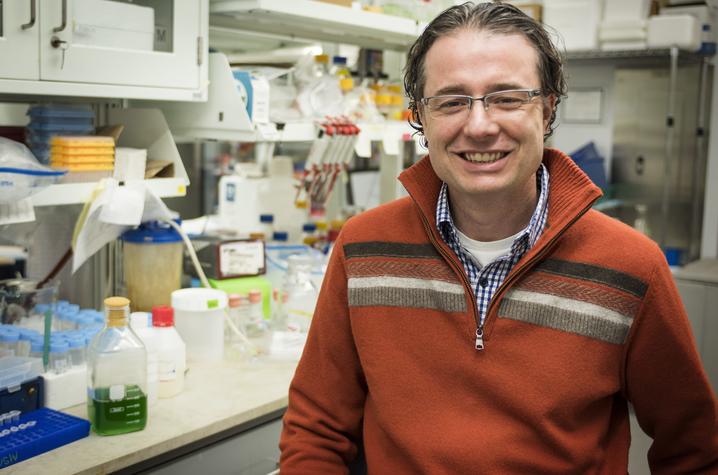UK Receives Prestigious Grant from National Institute of Neurological Disorders
LEXINGTON, Ky. (May 22, 2020) — University of Kentucky College of Medicine scientist Matthew Gentry is one of 20 recipients of a prestigious R35 grant from the National Institute of Neurological Disorders (NINDS) for his research on energy metabolism in the brain. The $8.8 million grant will fund Gentry’s lab in the Department of Molecular and Cellular Biochemistry over the next eight years.
“The goal is to boost scientific productivity in pursuit of the NINDS mission," said Dr. Walter Koroshetz, director of NINDS. "We want to get investigators away from their desks and back to the bench or clinic to more effectively mentor trainees, and conduct innovative studies that will improve our understanding of the brain and ultimately help us reduce the burden of neurological diseases.”
The work at UK in Gentry’s lab supported by this award will focus on novel insights in energy metabolism using cutting edge methodologies applied to multiple human diseases. “I am very excited to receive this award. This funding will allow us to advance our understanding and translate our work on Lafora disease (LD) to other neurological diseases,” Gentry said.
The immediate impact of the grant will be in the area of LD research. LD is a fatal, neurodegenerative epilepsy. LD patients develop normally until around age 10 when they have an epileptic episode. The episodes increase both quantitatively and qualitatively over the next decade. Horrendous seizures are coupled with very rapid neurodegeneration and culminates with the patients dying at around age 25 in a near vegetative state. LD patients have mutations in one of two genes. These genes both encode for proteins that are integral to sugar storage. These mutations result in sugar aggregates forming in nearly all cells within their bodies and are particularly damaging in the brain.
Gentry has been continuously funded by NINDS since 2006, and his team has made multiple important findings about LD. Based on this work, Gentry’s lab and others defined the molecular mechanisms that cause LD and multiple groups recently demonstrated that the sugar aggregates drive epilepsy and neurodegeneration. This foundational science allowed Gentry’s team to develop strategies to attack the disease and develop therapies.
The NINDS R35 grant mechanism allows researchers the freedom to embark on ambitious, creative, and/or longer-term research projects so they can make major contributions to neuroscience. Gentry commented, “This funding will allow us to work more broadly and expand our understanding of how brain metabolism normally functions and discover the impacts when this system is perturbed.” The foundational hypothesis for this grant is that LD serves as a model metabolic brain disease for defining disease mechanisms and developing therapies for more common diseases, including Alzheimer’s Disease (AD) and even extending to certain types of cancer. The grant supports work to define how mis-regulation of sugar metabolism impacts disease progression more broadly, determine how the removal of sugar aggregates impacts metabolism, and develop pre-clinical therapies.
Gentry also emphasized the key role of team science in this project. “This project is an outstanding example of the collaborative science that occurs at UK," he said. "A key aspect in securing this grant is the novel methods that our group recently developed in collaboration with Dr. Ramon Sun’s lab.” Sun is a recently hired assistant professor in the Department of Neuroscience in the College of Medicine. The Gentry and Sun labs collaborated to pioneer a number of new techniques to analyze the sugar aggregates. “Ramon with a number of trainees in our labs have done an outstanding job in letting their imaginations run wild to utilize some cutting-edge instruments in entirely new manners, allowing us to make seminal discoveries,” Gentry said.
In addition to collaborating with the Sun lab, structural biology experiments were performed with Craig Vander Kooi (Biochemistry), investigating AD mouse models with Lance Johnson (Physiology), and analyzing AD patient samples with Peter Nelson (Neuroscience and Sanders-Brown Center on Aging) all supported by this grant.
"We have outstanding support from Dean Robert DiPaola (College of Medicine) through the establishment of the Epilepsy & Brain Metabolism Alliance, our chairs Dr. Rebecca Dutch (Biochemistry) and Dr. Bret Smith (Neuroscience), Dr. Mark Evers (Director, Markey Cancer Center), and Lisa Cassis (Vice President of Research),” said Gentry.

As the state’s flagship, land-grant institution, the University of Kentucky exists to advance the Commonwealth. We do that by preparing the next generation of leaders — placing students at the heart of everything we do — and transforming the lives of Kentuckians through education, research and creative work, service and health care. We pride ourselves on being a catalyst for breakthroughs and a force for healing, a place where ingenuity unfolds. It's all made possible by our people — visionaries, disruptors and pioneers — who make up 200 academic programs, a $476.5 million research and development enterprise and a world-class medical center, all on one campus.




